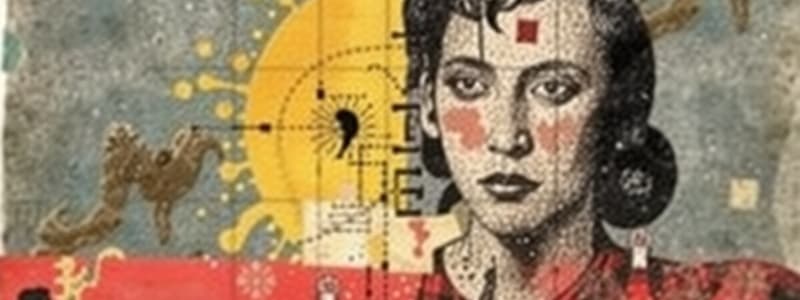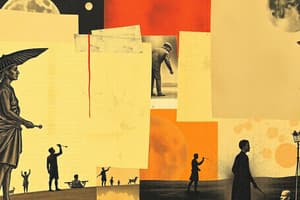Podcast
Questions and Answers
What are the primary themes explored in Marathi poetry?
What are the primary themes explored in Marathi poetry?
- Historical events and politics
- Fantasy and surrealism
- Technology and innovation
- Love, nature, and social issues (correct)
Which author is known for children's literature and moral teachings?
Which author is known for children's literature and moral teachings?
- B.R. Ambedkar
- P.L. Deshpande
- Sane Guruji (correct)
- N.S. Phadke
What themes do authors like Vijay Tendulkar often explore in their prose?
What themes do authors like Vijay Tendulkar often explore in their prose?
- Sports and competition
- Identity, culture, and human relationships (correct)
- Science fiction and technology
- Health and fitness
Which technique is suggested for improving understanding of literary terms and authors?
Which technique is suggested for improving understanding of literary terms and authors?
What type of social issues are prevalent in Marathi literature?
What type of social issues are prevalent in Marathi literature?
What is the focus of the exam preparation in this study material?
What is the focus of the exam preparation in this study material?
What literary devices should students be able to identify and use?
What literary devices should students be able to identify and use?
Which of the following resources is recommended for accessing historical and contemporary Marathi texts?
Which of the following resources is recommended for accessing historical and contemporary Marathi texts?
Study Notes
12th Marathi - Study Notes
Key Literary Works
-
Poetry:
- Analyzes poets like Surya Sen and Vasant Mood.
- Themes of love, nature, and social issues.
-
Prose:
- Focus on essays and short stories by authors such as P. L. Deshpande and Vijay Tendulkar.
- Themes of identity, culture, and human relationships.
-
Drama:
- Study of Marathi plays that emphasize social themes and character development.
Major Themes
-
Cultural Heritage:
- Exploration of Marathi traditions, festivals, and customs.
-
Social Issues:
- Issues like gender equality, caste, and poverty are prevalent in many works.
-
Identity and Self-discovery:
- Characters often journey through self-exploration and cultural identity.
Language Skills
-
Grammar and Syntax:
- Focus on advanced Marathi grammar.
- Practice writing essays and reports in formal Marathi.
-
Literary Devices:
- Identification and use of metaphors, similes, personification, and symbolism.
Exam Preparation
-
Text Analysis:
- Critical evaluation of assigned texts; understand themes, characters, and author's intent.
-
Practice Compositions:
- Write essays on given topics to improve argumentation and language skills.
-
Previous Years' Papers:
- Review past exam questions to understand patterns and commonly tested concepts.
Study Techniques
-
Group Discussions:
- Engage in group studies to explore diverse interpretations of texts.
-
Flashcards:
- Create flashcards for important literary terms, authors, and works.
-
Visual Aids:
- Use charts and mind maps to connect themes and main ideas.
Important Authors
-
Sane Guruji:
- Known for children's literature and moral teachings.
-
N. S. Phadke:
- Contributions to essays reflecting society and personal experiences.
-
B. R. Ambedkar:
- His works often explore social justice and reform in Marathi context.
Additional Resources
-
Marathi Literature Journals:
- Read contemporary criticism and articles for updated perspectives.
-
Online Courses/Podcasts:
- Seek out Marathi literary courses or discussions to enhance understanding.
-
Local Libraries:
- Utilize local libraries for access to historical and contemporary Marathi texts.
12th Marathi Literature
- Poetry delves into works by poets like Surya Sen and Vasant Mood, analyzing their themes of love, nature, and social issues.
- Prose examines essays and short stories by authors such as P.L.Deshpande and Vijay Tendulkar, focusing on themes of identity, culture, and human relationships.
- Drama focuses on Marathi plays that emphasize social themes and character development.
Major Themes
- Cultural Heritage is explored through the lens of Marathi traditions, festivals, and customs.
- Social Issues such as gender equality, caste, and poverty are prevalent in many literary works.
- Identity and Self-discovery are explored through characters who navigate journeys of self-exploration and cultural identity.
Language Skills
- Grammar and Syntax: Students learn advanced Marathi grammar and practice writing essays and reports in formal Marathi.
- Literary Devices: Students learn to identify and use metaphors, similes, personification, and symbolism in their writing.
Exam Preparation
- Text Analysis: Students should critically evaluate assigned texts, understanding themes, characters, and author's intent.
- Practice Compositions: Writing essays on given topics helps improve argumentation and language skills.
- Previous Years' Papers: Reviewing past exam questions helps students understand patterns and commonly tested concepts.
Study Techniques
- Group Discussions: Enhance understanding by engaging in group studies to explore diverse interpretations of texts.
- Flashcards: Create flashcards for important literary terms, authors, and works.
- Visual Aids: Use charts and mind maps to connect themes and main ideas.
Important Authors
- Sane Guruji: Known for children's literature and moral teachings.
- N.S.Phadke: Contributions to essays reflecting society and personal experiences.
- B.R.Ambedkar: Works often explore social justice and reform in the Marathi context.
Additional Resources
- Marathi Literature Journals: Stay informed with contemporary criticism and articles for updated perspectives on Marathi literature.
- Online Courses/Podcasts: Enhance understanding by seeking out Marathi literary courses or discussions.
- Local Libraries: Utilize local libraries for access to historical and contemporary Marathi texts.
Studying That Suits You
Use AI to generate personalized quizzes and flashcards to suit your learning preferences.
Description
Test your knowledge of significant Marathi literary works through poetry, prose, and drama. Explore major themes such as cultural heritage, social issues, and identity. Enhance your understanding of advanced grammar and literary devices in Marathi.




